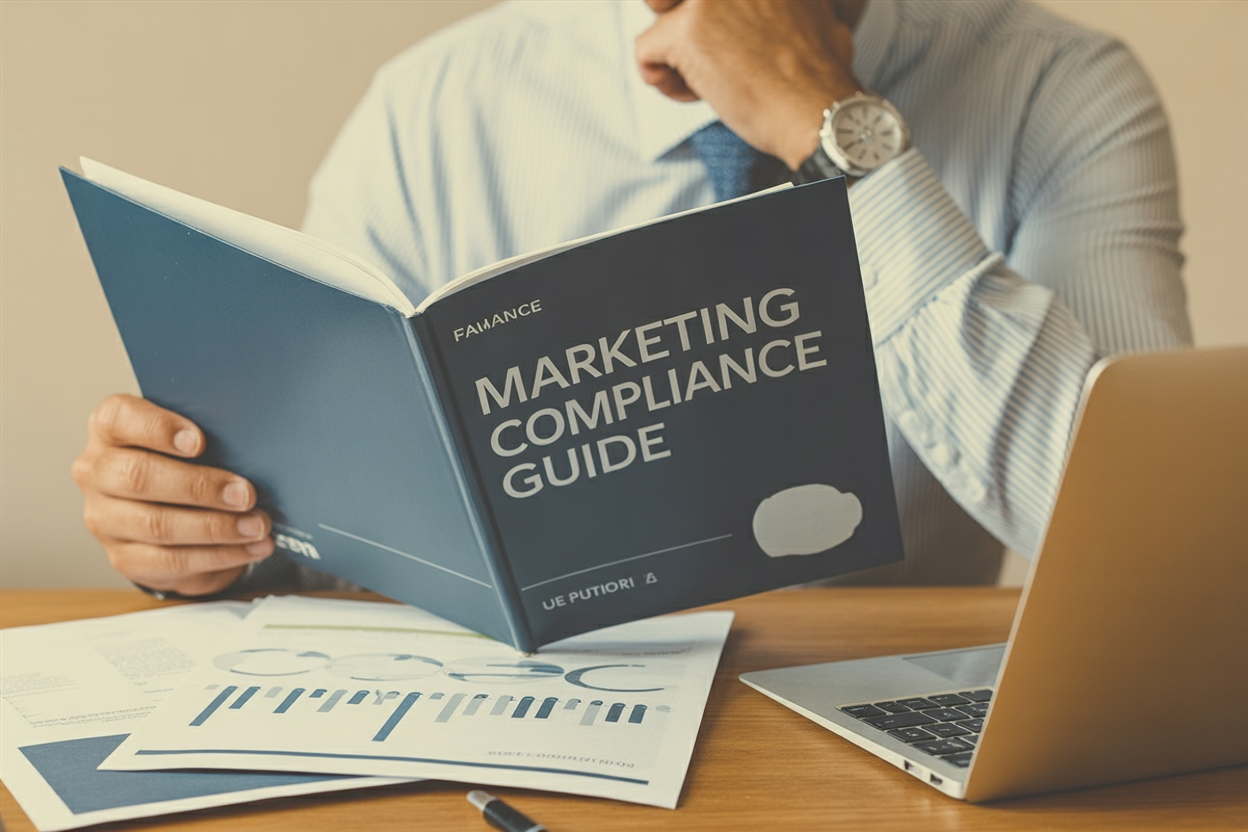Marketing compliance has become the number one headache for financial firms, and the numbers tell a pretty sobering story. We're talking about 57% of investment adviser compliance officers citing advertising and marketing as their most pressing compliance issue in 2024.
But what if you could catch those compliance issues before they become expensive mistakes? What if your marketing team could move fast without breaking things? That's exactly what we're going to explore today, and trust me, by the end of this piece, you'll have a roadmap that actually works.
Introduction to Marketing Compliance for RIAs & Brokers
The financial industry operates at a scale that's honestly pretty mind-boggling. We're looking at 15,870 SEC-registered investment advisers serving 68.4 million clients with $144.6 trillion in assets under management as of 2024. Meanwhile, the brokerage side has 3,298 FINRA-registered broker-dealer firms at the end of 2023.
When you're dealing with numbers like these, robust marketing compliance isn't just nice to have. It's absolutely critical.
Marketing compliance has consistently ranked as a top concern for financial firms. It was the number one issue in 2023, and even though it dropped to second place in 2024, regulators are paying close attention. SEC examiners reported advertising and marketing practices as a focus area in 57% of recent RIA examinations.
The consequences of getting this wrong can be brutal. Take the SEC's new Marketing Rule, which went into full effect in November 2022. In 2023, the SEC charged nine investment advisers for improper hypothetical performance ads, with $850,000 in combined fines. FINRA fined a broker-dealer $850,000 in 2024 for social media posts by paid influencers that were misleading.
Understanding Marketing Compliance
Marketing compliance in the financial industry means making sure all your promotional communications follow regulatory standards so they're fair, balanced, and not misleading. For broker-dealers, FINRA Rule 2210 governs public communications and requires that advertisements be "fair, balanced, and not misleading," with proper approvals, recordkeeping, and filings.
The SEC's Marketing Rule for investment advisers prohibits false or unsubstantiated claims and sets conditions on performance presentations and use of testimonials. Basically, marketing compliance is about following the rules (SEC, FINRA, state laws) in every ad, email, social media post, or client communication you put out there.

Importance of Compliance for RIAs and Brokers
Strong compliance isn't just about avoiding fines. It's about risk mitigation in an area where infractions are both common and expensive. The fact that 57% of compliance professionals surveyed in 2024 said advertising and marketing was one of their "hottest" topics tells you everything you need to know.
FINRA's 2024 targeted exam of social media marketing led to the first-ever action against a broker for inadequate influencer supervision. On the RIA side, the SEC's sweep under the new Marketing Rule penalized nine advisers for improper performance advertising.
But beyond avoiding fines, marketing compliance builds trust with clients. The rules are designed to protect investors from misleading claims, which means compliant firms actually gain credibility. A single compliance lapse can not only incur penalties but also damage client confidence.
Key Regulations Affecting Marketing Practices
The regulatory picture is complex and keeps changing. Let's break down the major rules you need to know about.
The SEC's modernized Marketing Rule took full effect in November 2022. This rule overhauled decades-old advertising regulations, broadening the definition of "advertisement" and allowing testimonials and endorsements under strict conditions. About 33.8% of RIA firms reported engaging in at least one of the newly covered marketing activities like showing performance results, testimonials, or hypothetical models.
Broker-dealers are governed by FINRA's advertising rules, primarily Rule 2210. FINRA actively monitors compliance. In 2023, broker-dealers filed over 63,000 communications for FINRA review.

Email marketing falls under laws like the U.S. CAN-SPAM Act, which carries penalties up to $51,744 per individual violating email. In 2024, the FTC obtained a record $2.95 million penalty against a company for "flooding" consumers with unsolicited emails.
Privacy regulations are becoming more important too. As of 2024, at least 19 U.S. states have passed comprehensive consumer data privacy laws. Data privacy has become a key compliance area, with 37% of compliance officers in 2024 citing cybersecurity and data protection as a "hot topic."
Creating a Marketing Compliance Checklist
Building an effective compliance checklist isn't just about covering all the bases. It's about creating a system that actually works in practice.
An effective checklist starts with having formal written policies and procedures for marketing compliance, plus an internal review process. You should require that all marketing content undergo compliance review and approval before use. For broker-dealers, this is mandated for many materials under FINRA rules. For RIAs, it's a best practice that aligns with fiduciary duties.
Your checklist must spell out compliance standards to verify in each piece of content. This means checking accuracy and truthfulness, ensuring balanced presentation of risks and benefits, including all required disclosures, verifying proper use of testimonials and endorsements, confirming accurate identification of advisors, avoiding unapproved promissory language, and maintaining proper records. The SEC requires advisers to keep advertisements and backup for 5 years.
Beyond checking each piece, your checklist should cover periodic audits. 65% of investment advisers surveyed in 2024 said they increased testing of advertising and marketing controls. About 65% of firms have conducted or plan to conduct a "mock SEC exam" of their compliance program, and 85% found these exercises useful.
Training is also critical. Over 90% of RIA firms conduct annual compliance training for employees.
RIAs and broker-dealers operate under different marketing rules, so your checklist should be customized to your firm's registration status. If you're dual-registered, you must satisfy both sets of rules. About 677 firms, roughly 20% of all broker-dealers, were also registered as investment advisers in 2023.
Tailoring also means considering your firm's size and marketing channels. Survey data shows larger advisers are far more likely to use advanced marketing techniques. 85% of firms over $100 billion AUM engaged in at least one of the Marketing Rule's covered practices, versus only about 22% of small advisers under $100 million AUM.
It's helpful to integrate an "FAQ" approach into your compliance checklist. The SEC has published "Marketing Compliance Frequently Asked Questions" guidance that answers common questions. For example, if an adviser cannot immediately update year-end numbers, the staff won't object to using interim quarterly figures for a short time, under certain conditions.
Implementing the Marketing Compliance Process
Having a checklist is one thing. Actually using it consistently is another.
One of the basic steps is setting up a pre-approval process for all marketing materials. Broker-dealers must have a registered principal sign off on many communications before use, and while the SEC doesn't explicitly require pre-approval for RIAs, having such a control is viewed favorably during exams.
To streamline compliance, many firms develop approved templates that already contain required disclaimer language and have standardized, compliance-checked wording.
Training your marketing and sales staff on compliance basics before they create content is often overlooked but really important. 91% of RIA firms were conducting annual compliance training even back in 2014.
After content is published, you need steps for monitoring live communications and testing compliance. 73% of advisers in one survey said they increased testing of electronic communications and off-channel messaging, and 65% increased testing of advertising and marketing.
Every firm should have a designated person or team responsible for marketing compliance, typically the Chief Compliance Officer (CCO). In practice, many CCOs wear multiple hats. A 2024 survey found 58% of advisory firm CCOs also hold another role in the firm.
The compliance team should be seen as a partner to marketing, not just a final hurdle. The compliance team is responsible for creating the marketing compliance policies and keeping them up to date. 74% of RIA firms in a 2023 survey said "keeping up with regulatory changes" was their number one compliance concern.
Maintaining standards starts with having strong internal policies and keeping them current. SEC rules require advisers to maintain copies of all policies and procedures in effect over the last five years. It's important to enforce your standards consistently among all employees.
Email Marketing Compliance

Email marketing brings its own set of compliance challenges that you really can't afford to get wrong.
All marketing emails must strictly follow CAN-SPAM Act requirements. This includes using accurate "From" and "Subject" lines, including a clear unsubscribe link and your firm's physical mailing address, and honoring opt-out requests promptly. Each individual email that violates CAN-SPAM can incur penalties up to $50,000 per email.
Treat mass emails like any other advertisement. Put them through compliance review before sending. In 2023, broker-dealers filed at least 3,734 email or text message communications with FINRA for review.
In the era of privacy regulation, data minimization is a sound principle. Only gather personal data from clients and prospects that you actually need for marketing. By 2024, 19 U.S. states have comprehensive privacy laws in effect.
For brokers especially, firms are required to supervise representatives' communications, including emails. "Electronic communications and off-channel communications" was cited as the number one compliance concern by 59% of firms in 2024, overtaking even the Marketing Rule.
Keep an eye on email metrics such as bounce rates, open rates, unsubscribe rates, and spam complaint rates. Unusually high unsubscribe or spam complaint rates may indicate your emails aren't aligned with recipient expectations, which is a warning sign for compliance.
Maintaining Compliance in Ongoing Marketing Efforts
Compliance isn't a one-time thing. It's something you need to stay on top of all the time.
The marketing compliance scene isn't static. Rules can change, and new guidelines emerge, so your checklist must be a living document. The SEC's overhaul of the advertising rule is a prime example. After decades of no major changes, the SEC in 2020 adopted the new Marketing Rule which changed what an "advertisement" includes.
If your firm launches new services or enters new marketing channels, update the checklist to cover those. For instance, if you start a podcast or YouTube channel, add checklist points for those media.
Regular training is critical to make sure your compliance checklist isn't just a document but a practice embedded in your team's daily work. Every new employee involved in marketing should receive training on the firm's marketing compliance rules as part of onboarding.

Make training practical. Walk through the compliance checklist and explain the rationale behind each item. Use case studies, perhaps anonymized incidents from your firm or public enforcement cases, to show consequences.
Keep training content up to date with regulatory changes. For example, after the SEC's Marketing Rule took effect, firms needed to update training from "testimonials are banned" to "testimonials are allowed with disclosures and oversight."
The phrase "set it and forget it" can never apply to compliance. Marketing strategies change, and so do regulations, so staying compliant is an ongoing effort. Consider the emergence of new marketing channels. A decade ago hardly any advisers were on Instagram or using influencers, but now those exist, and compliance has to adapt. In 2023, 65.2% of advisers reported using multiple websites or social media platforms to communicate with clients, up sharply from 49.1% just five years prior.
New technologies like artificial intelligence are starting to influence marketing. 46% of compliance survey respondents in 2024 said AI and predictive analytics are now a pressing compliance issue for them.
Set up a cadence (maybe quarterly) where compliance and marketing leadership meet to discuss the state of compliance. Review any incidents from the past period, upcoming campaigns and how to handle them, and any regulatory news.
As time goes on, consider investing in compliance tech tools that help manage ongoing compliance. There are digital solutions for content archiving, automated compliance reviews, and workflow systems to manage approvals. For social media, there are platforms that allow advisors to post only pre-approved content or that flag keywords of concern.
Final Thoughts
The firms that thrive will be those who treat compliance not as a box-ticking exercise, but as a core value that builds their credibility. By implementing a marketing compliance checklist appropriate to your business and keeping it up to date, you create a safety net that allows your marketing creativity to work within acceptable bounds. Remember, compliance is a compass, not a roadblock. It guides you toward honest, transparent marketing that can only strengthen your relationship with clients.
We've built Luthor to help you turn compliance into a competitive advantage rather than a bottleneck. Our AI-powered platform automatically reviews your marketing assets for compliance issues, flagging potential problems before they become expensive mistakes. You can reduce the risk, effort, and time needed to tackle marketing compliance at scale.
Ready to see how we can help streamline your marketing compliance process? Request demo access and discover how Luthor can help you move fast without breaking things.




